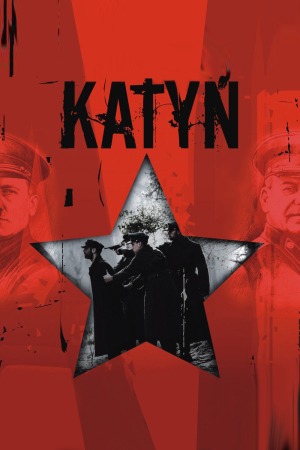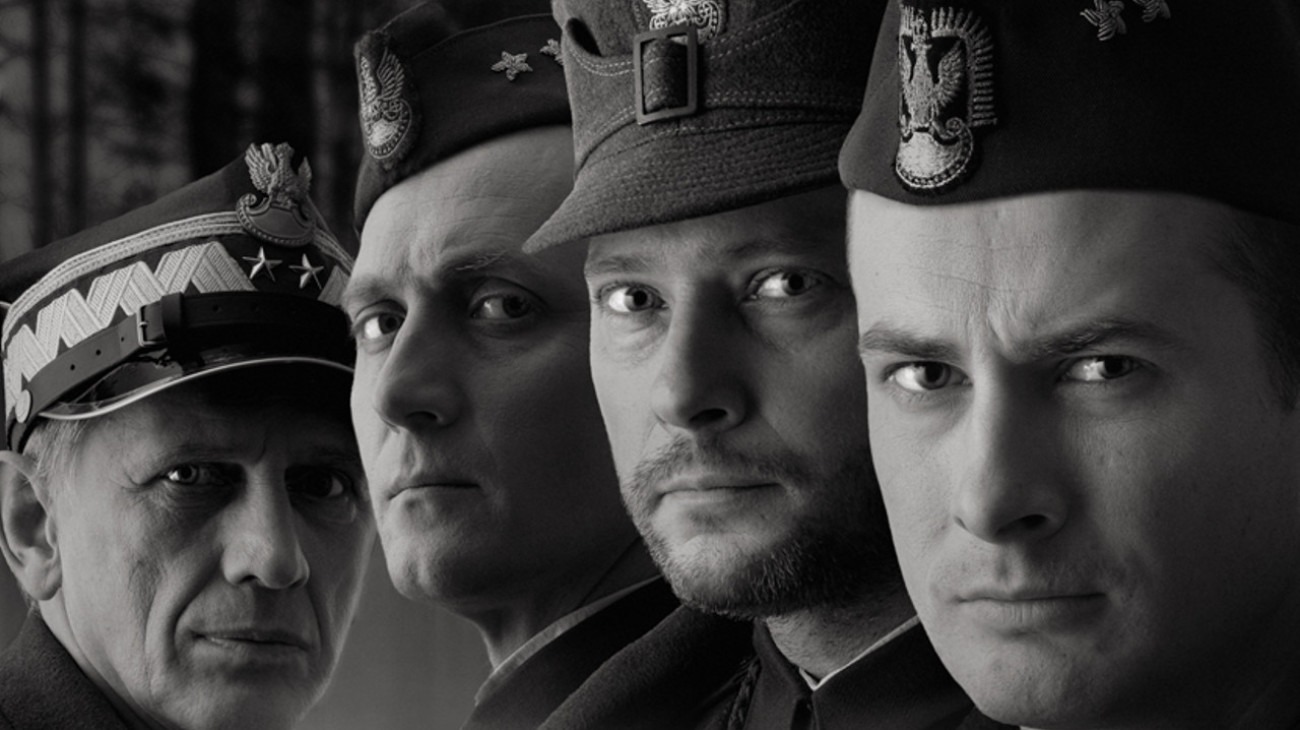
The 44th Chicago International Film Festival
In the spring of 1940, when Poland was ground zero in the tug-of-war between Nazi Germany and the Soviet Union to gain complete control of Eastern Europe, a group of some 12,000 Polish prisoners-of-war were executed and buried in mass graves in the Katyń Forest in Smolensk Oblast. The graves were discovered by the Nazis in 1943, leading to the dissolution of the alliance between the Soviets and the exiled Polish government, and an agreement by the Western Allies to help the Soviet Union to cover-up the massacre, in the interest of fighting the Germans. After the war, when Poland was swallowed up whole behind the Iron Curtain, the official story was that the executions had been perpetrated by the Nazis, and any Pole who dared suggest otherwise was disappeared by Stalin's goons. For many years, even speaking the word "Katyń" was informally prohibited in the former Poland.
Among those killed in Katyń was a cavalry officer named Jakub Wajda, whose 14-year-old son Andrzej would grow up to become one of the most significant filmmakers in Polish history, with several films in official competition at both the Berlinale and Cannes festivals (including a Palme d'Or in 1981), and a Lifetime Achievement Oscar in 2000. In 2007, he released a film memorialising the massacre and those who lost their life there, based on Andrzej Mularczyk's book Post Mortem; that film (an nominee for Best Foreign Language Film at last year's Oscars) was simply titled Katyń.
It's the kind of extraordinarily serious motion picture made with such deeply impassioned sincerity that it makes you feel sick at heart to suggest that maybe there's something wrong with it; and yet I cannot force myself to regard it as a success. It makes me feel like an absolute dick to say that, I assure you: the man lost his dad at Katyń, for Christ's sake, who am I to tell him that his movie isn't any good? (Because I'm positive that Andrzej Wajda lies awake at night wondering what random American film bloggers think about his work).
The problem with Katyń is a very simple one: like so many deeply personal films it is entirely bereft of subtlety, and comes across as haranguing. It's ironic (and almost certainly unintentional) that a film so profoundly anti-Soviet should bear such a strong resemblance to the unbearable Soviet war propaganda films of the 1950s, but that's exactly where my mind kept going over and over for the entirety of the film's two hours: deeply noble patriots filmed constantly with such reverence that they might as well have halos stand trembling with tear-filled eyes as the terrible enemies of the people storm across the screen with all the ee-vil swagger of Victorian stage villains. It's unabashed melodrama through and through, enough to make a silent film quiet and restrained by comparison.
Compare this to something like Steven Spielberg's Schindler's List, another film whose desire to be seen as an important historical work of profound humanity leaps of the screen with such abandon that it might as well have been titled Hi, I'm Steven, and This Is My Noble Prestige Drama. Critics of that film have a point when the speak of the simple-minded populism and cardboard heroes and villains, but they ignore the central character of Oskar Schindler himself, whose transformation from cynical war profiteer to good man is the basis of the entire screenplay. Katyń doesn't have an Oskar Schindler; the closest thing it has to a grey character is a Russian officer who hides his Polish friend Anna (Maja Ostaszewska, the closest the film comes to a single protagonist) from his colleagues charged with rounding up the survivors of the missing POWs.
It might be easier to forgive the lack of realistically-developed characters, if this weren't a symptom of the disease afflicting the whole movie: in its headlong rush to declare its own importance, it forgets to be whatsoever engaging. Though a decently-crafted film (shot by the reliable Pawel Edelman, one of the world's foremost creator of beautiful and sad images that skew just a bit to the manipulative side), it is resolutely airless and leaden. Its 118 minutes feel half-again that long, and at the end I was keenly aware that I should be very sad, although it was hard for me to say that I really was.
The clearest sign that Wajda and his writers are anxious to make sure we feel exactly the right emotions is an element of the film's structure: beginning with the round-up of POWs in 1939, the film proceeds chronologically past the massacre and into the years after the war, and how the mothers and wives and daughters and sisters of the slain pick up their lives and go on. It's a curious thing that we never see the actual Katyń Forest Massacre itself, given that in the time leading up to that moment we've spent much of the film with Anna's husband Andrzej (Artur Żmijewski), and there would have been ample story justification; the reason becomes clear at the film's end. For the only time, Wajda skips chronology to show us the massacre only when Anna is given her dead husband's diary to read, so that the last sequence in the film follows Andrzej's final moments of life. It's a visceral and brilliantly brutal sequence - absolutely the best part of the film - but stuck in at the end like that, I can only assume that the filmmakers are all but telling us: don't leave this theater feeling remotely pleasant. Here's violent death. The end. It's appalling manipulative, but since all of Katyń has been that way, I don't mean to complain loudly about it.
The one saving grace is that Wajda has stated in numerous places that Katyń is a film to give catharsis to the Polish people, and he doesn't really give a damn what anyone else thinks. It wouldn't be the first time that a film is meant solely for the residents of its director's homeland (I've always wondered how well Altman films play outside of America, for example), and as long as I know that I'm not supposed to feel the full gamut of emotions, I guess I can be satisfied that all I really felt was resentment at having been played by an obviously-talented filmmaker whose only goal was that I be impressed by the crushing weight of history.
4/10
Among those killed in Katyń was a cavalry officer named Jakub Wajda, whose 14-year-old son Andrzej would grow up to become one of the most significant filmmakers in Polish history, with several films in official competition at both the Berlinale and Cannes festivals (including a Palme d'Or in 1981), and a Lifetime Achievement Oscar in 2000. In 2007, he released a film memorialising the massacre and those who lost their life there, based on Andrzej Mularczyk's book Post Mortem; that film (an nominee for Best Foreign Language Film at last year's Oscars) was simply titled Katyń.
It's the kind of extraordinarily serious motion picture made with such deeply impassioned sincerity that it makes you feel sick at heart to suggest that maybe there's something wrong with it; and yet I cannot force myself to regard it as a success. It makes me feel like an absolute dick to say that, I assure you: the man lost his dad at Katyń, for Christ's sake, who am I to tell him that his movie isn't any good? (Because I'm positive that Andrzej Wajda lies awake at night wondering what random American film bloggers think about his work).
The problem with Katyń is a very simple one: like so many deeply personal films it is entirely bereft of subtlety, and comes across as haranguing. It's ironic (and almost certainly unintentional) that a film so profoundly anti-Soviet should bear such a strong resemblance to the unbearable Soviet war propaganda films of the 1950s, but that's exactly where my mind kept going over and over for the entirety of the film's two hours: deeply noble patriots filmed constantly with such reverence that they might as well have halos stand trembling with tear-filled eyes as the terrible enemies of the people storm across the screen with all the ee-vil swagger of Victorian stage villains. It's unabashed melodrama through and through, enough to make a silent film quiet and restrained by comparison.
Compare this to something like Steven Spielberg's Schindler's List, another film whose desire to be seen as an important historical work of profound humanity leaps of the screen with such abandon that it might as well have been titled Hi, I'm Steven, and This Is My Noble Prestige Drama. Critics of that film have a point when the speak of the simple-minded populism and cardboard heroes and villains, but they ignore the central character of Oskar Schindler himself, whose transformation from cynical war profiteer to good man is the basis of the entire screenplay. Katyń doesn't have an Oskar Schindler; the closest thing it has to a grey character is a Russian officer who hides his Polish friend Anna (Maja Ostaszewska, the closest the film comes to a single protagonist) from his colleagues charged with rounding up the survivors of the missing POWs.
It might be easier to forgive the lack of realistically-developed characters, if this weren't a symptom of the disease afflicting the whole movie: in its headlong rush to declare its own importance, it forgets to be whatsoever engaging. Though a decently-crafted film (shot by the reliable Pawel Edelman, one of the world's foremost creator of beautiful and sad images that skew just a bit to the manipulative side), it is resolutely airless and leaden. Its 118 minutes feel half-again that long, and at the end I was keenly aware that I should be very sad, although it was hard for me to say that I really was.
The clearest sign that Wajda and his writers are anxious to make sure we feel exactly the right emotions is an element of the film's structure: beginning with the round-up of POWs in 1939, the film proceeds chronologically past the massacre and into the years after the war, and how the mothers and wives and daughters and sisters of the slain pick up their lives and go on. It's a curious thing that we never see the actual Katyń Forest Massacre itself, given that in the time leading up to that moment we've spent much of the film with Anna's husband Andrzej (Artur Żmijewski), and there would have been ample story justification; the reason becomes clear at the film's end. For the only time, Wajda skips chronology to show us the massacre only when Anna is given her dead husband's diary to read, so that the last sequence in the film follows Andrzej's final moments of life. It's a visceral and brilliantly brutal sequence - absolutely the best part of the film - but stuck in at the end like that, I can only assume that the filmmakers are all but telling us: don't leave this theater feeling remotely pleasant. Here's violent death. The end. It's appalling manipulative, but since all of Katyń has been that way, I don't mean to complain loudly about it.
The one saving grace is that Wajda has stated in numerous places that Katyń is a film to give catharsis to the Polish people, and he doesn't really give a damn what anyone else thinks. It wouldn't be the first time that a film is meant solely for the residents of its director's homeland (I've always wondered how well Altman films play outside of America, for example), and as long as I know that I'm not supposed to feel the full gamut of emotions, I guess I can be satisfied that all I really felt was resentment at having been played by an obviously-talented filmmaker whose only goal was that I be impressed by the crushing weight of history.
4/10






